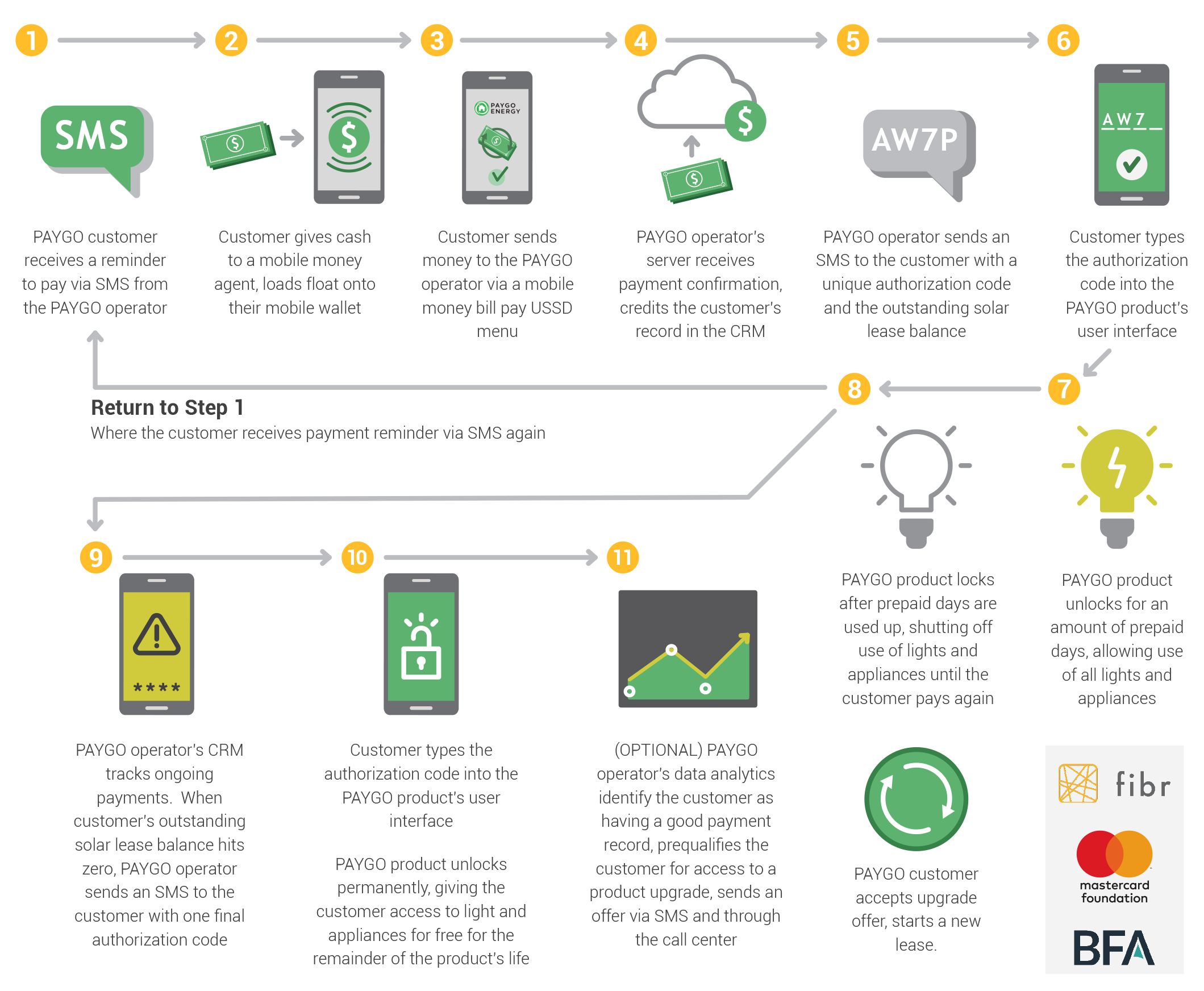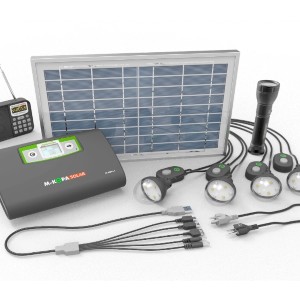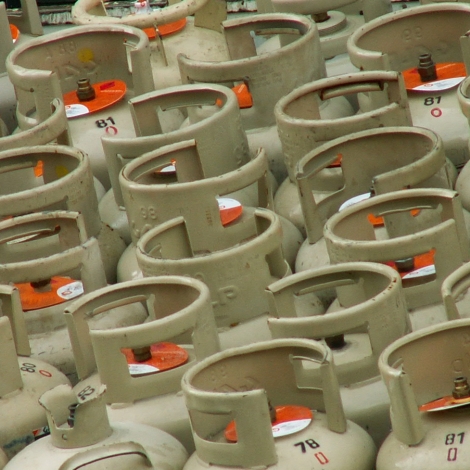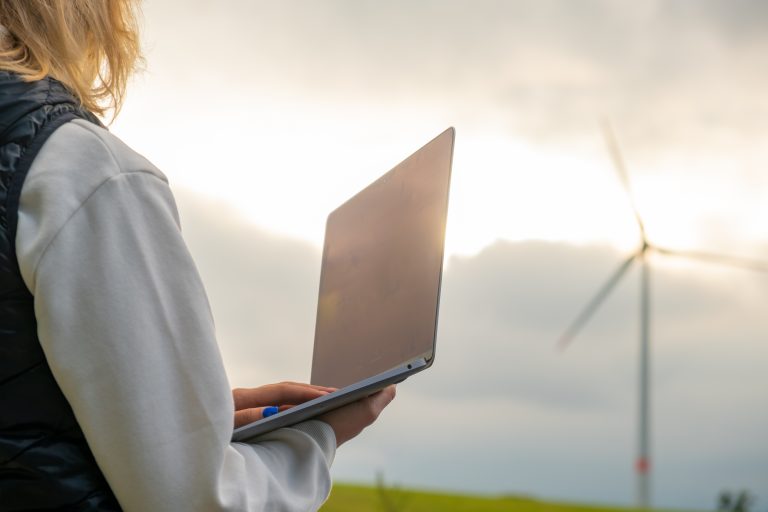Low-income African households have recently begun to fill up with refrigerators, gas stove tops, TVs and other appliances that are commonplace in the homes of higher earners. Rather than pay for them outright, the continent’s traditionally underserved populations are adopting pay-as-you-go plans. PAYGO, as it is called, has emerged as the confluence of two kinds of technological innovations that have gained popularity in the region: mobile banking and devices that add Internet connectivity to appliances and other expensive goods.
PAYGO is a business model that provides the customer with the products they want at no upfront cost, or at a very small cost. Once the products are in their homes, customers send daily, weekly or monthly payments, in most cases via mobile money. PAYGO has taken advantage of the widely developed and accepted mobile money platforms in the continent, such as M-PESA in Kenya and MTN Mobile Money in Nigeria. The image below provides an illustration of the different stages of PAYGO.

The chart depicts a payment process for solar products, first published in the briefing by FIBR and the Mastercard Foundation, PAYGO SOLAR: Lighting the Way for Flexible Financing and Services.
Different companies have developed varying PAYGO payment plans with most repayment plans ranging from 12 to 36 months. An initial payment of between 10-20% is however required before the product is delivered to the end user. In instances where the end user fails to make a payment, the companies are able to remotely disable or switch off the unit. The products are designed with GPS trackers which transmit signals over the available GSM Networks. Other companies have however adopted a different approach, the end user never gets to own the product but only pays for what they use (Utility based payment plan).
The number of people with no access to electricity increased in 2020, according to the International Energy Agency (IEA). Sub-Saharan Africa contributed the highest percentage at 77 percent of the global population without electricity access. This has prompted companies such as M-KOPA to get into this space and offer off-grid solar electricity. M-KOPA, an asset financing platform has made it possible for over 1 million customers to access solar lighting. By providing PAYGO Solar, the company has diversified by further providing the end user access to televisions, smartphones, and refrigerators among other appliances. The customers deposits KSH 2999 (USD $25.05) to get the Solar Kit after which they pay 50 KSH (USD $0.42) daily for a period of 600 days in order to fully own the kit. With the insights and success achieved in East Africa, M-KOPA expanded into Nigeria in 2021.

The M-KOPA 5 provides a technology platform that combines embedded GSM + mobile payments to enable solar home system financing. See it in E4C’s Solutions Library.
Cooking in Sub-Saharan Africa, especially in the rural areas is still characterized by 3 stone firewood hearths and a high dependency on firewood. Access to clean cooking remains a major issue in Africa, the International Energy Agency (IEA) states that access has only increased by barely 2%, from 15% in 2015 to 17% in 2020. Companies such as M-GAS have stepped in to increase access to clean cooking through the provision of an LPG cooking package (composed of a 13kg LPG cylinder that comes connected to a smart meter and a table top cooker). The package is provided to the end user with no upfront fees, all the customer has to do is pay for the gas they consume. Once the end user pays via M-PESA, the payment will reflect on the smart meter, the smart meter indicates the gas level as well as the available credit in the account. The image below illustrates how M-GAS operate.
PAYGO has made it possible for low-income households to access products and services that were previously beyond their reach by lowering the threshold of ownership of these products and services. The impact of PAYGO has been multifaceted, through the adoption of clean cooking, it has been possible to alleviate health ailments that were associated with the use of firewood and fossil fuels such as kerosene. According to IEA, access to clean cooking report 2022, close to 490,000 premature deaths are associated with household air pollution annually due to lack of clean cooking. In addition to this, reduced expenditure on fossil fuel results in more money available in the household which improves the quality of life. Estimations by M-KOPA shows that in the first four years of switching to their Solar Kit, the end user saves up to (USD) $750. Improvement in the grades of children with electricity access has also been observed, this is associated with the ability of the students to study late into the night or early in the morning.
Having observed the success of PAYGO in Kenya, adoption of this payment model by more companies would likely result in the widespread uptake of products and services by unserved and underserved communities on the continent. PAYGO creates a win-win situation; it provides an avenue through which companies can grow by offering fit-for-service solutions to the end user, without financially burdening them or blocking their access to the product or service.
About the Author
Isaac Kimani Njoroge is a Mechanical Design Engineer based in Nairobi, Kenya, and a former Engineering for Change Fellow.


Good article, but it misses one point – that many PAYGO systems, especially smaller ones, do not embed GSM for two reasons 1: its expensive, adds quite a bit to the cost of a device over the approx two-year period. and 2: Many people who lack access to electricity also lack access to GSM at home – they might have to walk into town to be closer to a tower for example.
Disclaimer: I was founder of Lumeter, which was one of the leading PAYGO technologies incorporate into a number of company’s products. We sold Lumeter to Mobisol in 2017.
– Mitra